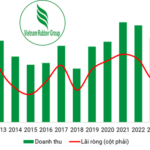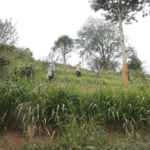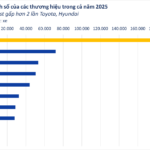Vietnam is entering a new phase where industrial growth can no longer rely solely on expansion and resource consumption. Instead, it must be underpinned by technology, productivity, and sustainable development.
In other words, we need to transition our growth model from resource-intensive to technology-intensive and innovation-led.
However, a significant question arises: How can businesses, especially in the manufacturing sector, simultaneously maintain high growth rates while meeting increasingly stringent environmental standards?
At a panel discussion titled “Harmonizing High Growth Targets and Sustainable Development” held by the Vietnam Economic Times Magazine on July 9, 2025, several leading companies, including Garment Corporation 10, Vietnam Steel Corporation (VnSteel), Panasonic, CNCTech, and VietCycle, shared their challenges and pioneering efforts in embracing green transformation. They emphasized their commitment to sustainable development as a long-term strategy.

Ms. Nguyen Thi Phuong Thao, Executive Director of Garment Corporation 10, shared that their journey towards green transformation is driven not only by market pressures and Vietnam’s net-zero emission commitment at COP26 but also by their intrinsic understanding of the importance of sustainability. “Failing to go green will hinder our ability to integrate internationally and remain competitive in global supply chains,” she emphasized. “It is also our responsibility as a business to care for the environment and society.”
In the steel industry, Mr. Pham Cong Thao, Vice President of VnSteel and Vice Chairman of the Vietnam Steel Association (VSA), pointed out that the biggest pressure for transformation likely comes from export markets.
Vietnam currently exports approximately 13 million tons of steel worldwide, with 40% going to developed countries such as the EU (27%) and the United States (13%).
The EU, for instance, is introducing stringent regulations for imported products, such as the Carbon Border Adjustment Mechanism (CBAM) to be implemented from 2026. To remain competitive in this market, Vietnamese businesses must meet these requirements, or they will need to seek alternative markets.
In addition, government environmental policies also play a significant role in pushing businesses towards green transformation.
Mr. Hoang Duc Vuong, Chairman of VietCycle and Vice Chairman of the Vietnam Plastics Association (VPA), highlighted that European markets now require 30% recycled plastic content in plastic products, increasing to 35% by 2028. For specific products like garbage bags, this requirement is as high as 70%. As a result, the plastic industry is forced to adapt, invest in new technologies, and adopt recycled materials.
Faced with these pressures, many businesses have taken the initiative to embrace green transformation. Ms. Nguyen Thi Phuong Thao shared that Garment Corporation 10 has been on this journey for over five years, starting with the use of sustainable raw materials, including recycled and organic cotton. They have invested in rooftop solar power systems, generating millions of kWh at their large facilities, and transitioned from coal-fired boilers to biomass boilers, significantly reducing CO2 emissions.
Green transformation is no longer an option but a necessity for survival and growth in the new global context. However, businesses cannot do it alone. The industrial production sector needs an ecosystem of consistent policies, green finance, suitable technologies, and collaboration among stakeholders to support this transformation.
Additionally, they proposed promoting an innovative ecosystem that fosters connections between businesses, research institutes, and universities.
“Sustainable Infrastructure Development for Long-Term Industrial Growth”
Vietnam is striving towards a dual goal of achieving high-income status by 2045 and sustainable development, with a Net Zero target by 2050. According to experts, one of the crucial prerequisites to attaining these goals is the development of a green industry.
Carbon Credit Sales: Empowering Farmers to Prosper
Ecological agriculture and circular farming are not just methods of cultivation, but a philosophy that strives for long-term sustainability for both people and the planet. With a shared goal of achieving Net Zero by 2050, Vietnam’s agricultural sector is undergoing a transformation towards ecological farming practices to protect natural resources and community health, paving the way for a green, clean, and resilient future.
The Green Revolution: Unlocking the Power of Carbon Credits
Minister Le Minh Hoan emphasized that the carbon credit market is a novel concept for both the world and Vietnam. The benefits for citizens participating in the 1-million-hectare high-quality and low-emission rice project are exponentially greater.
“Incentivizing Investment in Sustainable Smart Industrial Parks: A Policy Mechanism for Vietnam’s Future”
A myriad of experts advocate for a policy mechanism that incentivizes investment in, and the development of, new-generation smart and sustainable industrial zones. This includes delineating specific standards and criteria for what constitutes a “green” industrial zone, as well as establishing a clear framework of incentives and support for investors and industrial zone developers who wish to embark on new projects or transition from old models to these new-generation zones.




















